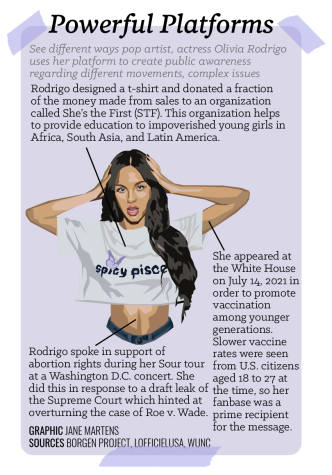platform activism
Students, staff reflect on effectiveness of celebrity activism
On July 14, 2021, Olivia Rodrigo gave a compelling speech at the podium of the White House briefing room. She was there to promote the new COVID-19 vaccine, encouraging young people in particular to get vaccinated. During this time, the highly contagious Delta variant of COVID was on the rise.
Macy Wood, Olivia Rodrigo fan and senior, commended the singer’s actions.
“I thought that it was amazing to see Olivia Rodrigo at the White House, especially considering she only became mainstream six months prior with ‘Drivers License,’” Wood said. “As a fan I know she really values the ability to voice her opinion to hopefully make a difference, so I think she was the best choice to be the “Gen Z Rep” for the issue of COVID-19 vaccines. In terms of effectiveness, I think the fact that she was still a new artist made the event more prominent because it turned some heads.”
Senior Jade Meek was more skeptical of Rodrigo’s activist stance. She said she feels it was excessive to attend the White House in order to promote her message.
“I feel like the whole thing was more on the side (for Rodrigo) to get more recognition,” Meek said. “I just think it’s unnecessary to go to the president’s office and speak out about the vaccines, maybe a post on social media would have been just as effective.”

World history teacher Page Deddens agreed with Wood that celebrity PSAs can be effective in changing some public opinion.
“We give a lot of power to celebrity in this country and I do think they have the power to sway some in their perceptions of certain topics,” Deddens said via email. “I think some of the most effective use of celebrity is used to address public health concerns like the COVID-19 pandemic, as long as the campaign
appears authentic. For example, the campaign during the pandemic of celebrities signing ‘Imagine’ during lockdown appeared to be inauthentic so it didn’t have much of an impact and was often criticized.”
Deddens is referring to a video posted by Gal Gadot in March 2022, the onset of the pandemic. The video featured a compilation of prominent celebrities such as Natalie Portman singing John Lennon’s famous song “Imagine” in an attempt to bring unity hope to the masses. The video resulted in murky responses and comments from viewers calling the video tone-deaf to the harsh struggles many people endured as a result of the pandemic.
Deddens said that although celebrity activism has been exacerbated by social media, it has always been a constant among artists.

“Celebrity political endorsement and activism has been around since the birth of the celebrity,” Deddens said via email. “The first that come to mind personally are Muhammad Ali and Jane Fonda. I know Sammy Davis Jr. and Sidney Poitier were active in their support of the Civil Rights Movement. In a more modern sense I know many current celebrities have used their fame to endorse causes like climate change and advocate for protections of LGBTQ+ rights and minority rights.”
Although Wood supports Rodrigo’s activist endeavors, she said she feels that it is difficult to partake in true activism in today’s culture.
“I believe that artists should have the ability to speak up on issues they care about whenever they would like,” Wood said. “But, I worry that new artists feel pressured to now represent a certain cause with the modern risk of being canceled. Personally speaking, I don’t like it when every celebrity tells me to go and vote. Like I get it. I think that for some they may have tagged along this trend in hopes of improving their platform. In the end though I never really turn to artists for much advice on larger issues and mostly stick to admiring the artistic work they are known for and, what I believe to be, more passionate about.”
Although skeptical of Rodrigo’s White House visit, Meek said she is supportive of effective celebrity activism.
I think the spreading of awareness relies more on the issue artists discuss,” Meek said. “If it’s a seemingly controversial issue that needs to be taken seriously because its consequences will harm others, I’m all for celebrities taking a stand against it.”
Deddens said that the responsiveness on the public to celebrity activism is dependent on their interest in a particular artist or Hollywood in general.
“I can see the benefits and the disadvantages for celebrities using their platforms for activism,” Deddens said via email. “I think often how you feel about celebrity activism often aligns with your own beliefs and politics. If a celebrity is endorsing a cause you also feel passionate about you are more likely to support the use of celebrity to enact change. Personally I don’t find celebrity endorsements all that compelling. There are very few celebrities that I personally follow and look up to so that probably plays a role in how I feel about them.”
Wood agreed with Meek that the topic of the issue itself determines its effectiveness in compelling the public.
“It really depends on the audience of the artist speaking out,” Wood said. “I know that the voter turnout has definitely increased in the past years and some of this has to be from the large promotion of voting from artists. When it comes to other issues, such as climate change and mental health, I think it’s harder to see real influence artists have. So while they definitely bring more awareness to larger issues, it’s still hard to measure whether it brings about actual change.”

